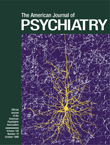Clinical and Neurobiological Correlates of Cytogenetic Abnormalities in Childhood-Onset Schizophrenia
Abstract
OBJECTIVE: Cytogenetic abnormalities are increased in schizophrenia, suggesting a possible etiologic contribution. However, their clinical and pathophysiologic roles in the disorder are unknown. To investigate this, a group of children and adolescents participating in a comprehensive study of childhood-onset schizophrenia were screened for chromosomal abnormalities, and their clinical and neurobiological correlates were examined. METHOD: Cytogenetic screening with the use of high-resolution banding, fluorescent in situ hybridization for chromosome 22q11 deletions, and molecular fragile X testing was undertaken in a group of 47 children and adolescents with very early onset of schizophrenia. Clinical, neurobiological (including brain morphometry), and risk factor measures of the subjects with cytogenetic abnormalities were compared with those of the remaining patients without cytogenetic anomalies. RESULTS: Five patients had previously undiagnosed cytogenetic abnormalities. Lower performance IQ and more pronounced premorbid developmental impairments were seen in this subgroup. Rates of obstetric complications, familial schizophrenia spectrum disorders, and familial eye tracking dysfunction were similar for the patients with and without cytogenetic abnormalities. CONCLUSIONS: Cytogenetic abnormalities appear to be increased in childhood-onset schizophrenia, suggesting an association with a very early age at onset. The data from the subgroup of patients with cytogenetic anomalies are consistent with a model in which a childhood onset of schizophrenia is due to a greater impairment of neurodevelopment secondary to the interaction of a number of factors, particularly genetic ones.



